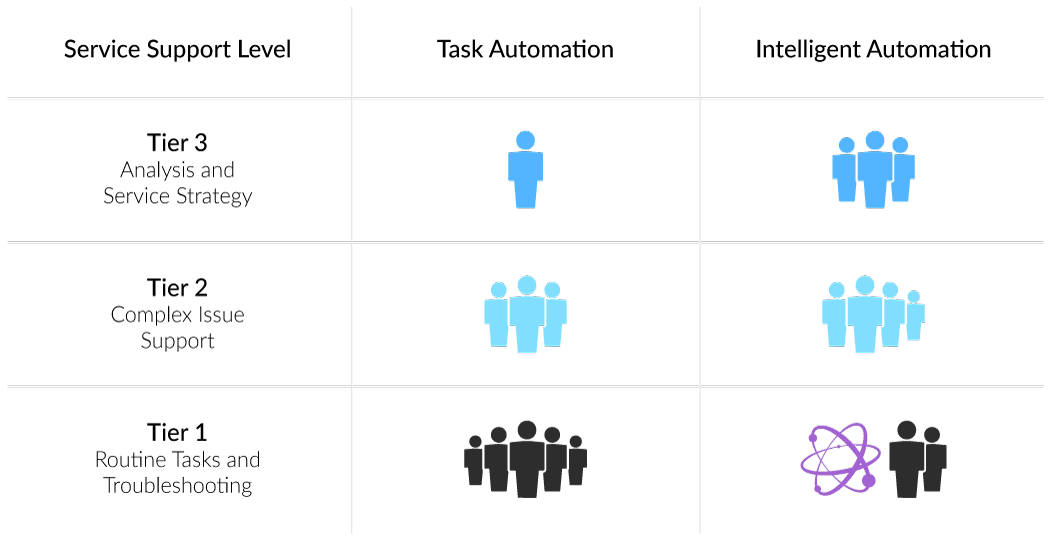Advancing IT with Intelligent Automation
As the IoT continues to generate Big Data at a growing rate, technologies like Intelligent Automation are becoming increasingly necessary for businesses to stay competitive. In fact, companies on average are expected to invest in Intelligent Automation within the next four years. And with a staggering 75 percent of enterprises pursuing and adopting automation within their IT operations, it’s clear that Intelligent Automation is rapidly emerging as the future of IT operational strategies.[1 But what is Intelligent Automation, and what advantages does it bring to the table for IT departments?
75 percent of enterprises are pursuing and adopting automation within their IT operations.[1]
Milestone’s recent partnership with a leading provider of Intelligent Automation (IA) and Artificial Intelligence (AI) software, Amelia, places us at the forefront of the digital transformation. We sat down with their Chief Commercial Officer, Jonathan Crane, to gain his insight on how Intelligent Automation is changing the way businesses operate.
What is Intelligent Automation?
Intelligent Automation (IA) is a combination of automation and Artificial Intelligence (AI) with advanced capabilities like machine learning and predictive analysis that make it possible to interpret data, make decisions, and adapt to change. As a result, IA tools can gain a contextual understanding of different business environments by gathering information and identifying patterns. Through semantic and episodic learning, Intelligent Automation goes beyond the capabilities of scripted bots – IA tools analyze incidents to independently seek out solutions and make predictive adjustments.
How is IA different from task automation?
Machine learning and Artificial Intelligence capabilities differentiate Intelligent Automation from traditional task automation, because IA tools are configured to imitate cognitive thinking by finding solutions to unresolved problems. Task automation, on the other hand, is coded to follow pre-determined processes without applying any problem-solving capabilities. In this sense, task automation tools are unable to provide end-to-end automated solutions. By combining AI with task automation, businesses can benefit from the advantages of IA technology.
What are the biggest advantages IT leaders have to gain from IA?
One of the key benefits that IA offers is the ability to automate tasks that are repetitive in nature. By doing so, businesses have the potential to reallocate the resources that would have been spent on mundane tasks to invest in strategic development for higher-level operations and job elevation. Intelligent Automation also helps improve customer relationships by delivering a more efficient and accurate customer experience (CX). IA tools don’t just reduce error rate, but they also study patterns to continuously improve IT performance. Finally, Intelligent Automation enables greater visibility, allowing businesses to evaluate vendor and internal efficacy based on performance analytics.
What differentiates IPcenter from other platforms?
It’s difficult to compare Amelia’s IA Platform, IPcenter, to another platform, such as ServiceNow, because it’s not an exact comparison. IPcenter is built on an accumulation of knowledge and expertise we have gained from managing IT environments. Drawing from our years of experience, we coded 25,000 out-of-box automations into our exhaustive remediation library, allowing IPcenter to understand and execute 85 percent of tasks in a typical IT model. ServiceNow is primarily an ITSM ticketing system that is expanding its capabilities by building out an IA library. However, its current range of IA capabilities is still limited. IPcenter is much more than just a ticketing system. Our platform not only contains an intelligent workflow that utilizes ticket information and integrates into almost any IT infrastructure, but it also has the most aggressive service level agreement (SLA) for priority resolution.
How does IPcenter learn or recognize patterns?
IPcenter’s learning abilities are supported by human assistance. If an incident occurs, the IPcenter platform takes a note and logs the incident. When the problem occurs again, IPcenter, with assistance from a NOC engineer, will create an automation to resolve the issue. Once the automation is validated with a service engineer and signed off by the client, it is implemented into the IT environment and logged in the remediation library. Through this process, IPcenter can compare environments and identify opportunities for more automations. As a result, the IPcenter platform is constantly learning new solutions and consistently updating our database of 25,000 automations.
The IPcenter platform is constantly learning new solutions and consistently updating our database of 25,000 automations.
How can IPcenter transform an end-to-end operation?
Let’s follow the example of a router that is having problems with network connectivity. In IPcenter, a ticket will be automatically generated for the router. Through an automated process, IPcenter will reference a list of all the potential issues a router might have trouble with. If anything on the list matches against the identified incident, IPcenter will resolve it with an automation from the remediation library. If not, IPcenter will escalate the incident to the appropriate Tier 2 or 3 engineers using a skills routing engine. The engineer will be able to study the router and all relevant diagnostics on a centralized dashboard and implement the appropriate solution. At the end of every incident, data is collected to be analyzed and added to the automation database.

From more efficient Service Desks to optimized Network Operations, Intelligent Automation clearly offers significant benefits for enterprises. Our conversation with Crane ended with one major takeaway: businesses leveraging IA tools have the ability to take action that is not just proactive, but predictive. To learn more about how Intelligent Automation can be properly implemented to benefit businesses, check out our next Q&A with Milestone’s EVP of Global Technology Operations.
1 2017 Everest Group Survey: “Customer (Dis)Satisfaction: Why Are Enterprises Unhappy with Their Service Providers?
Contact Us




